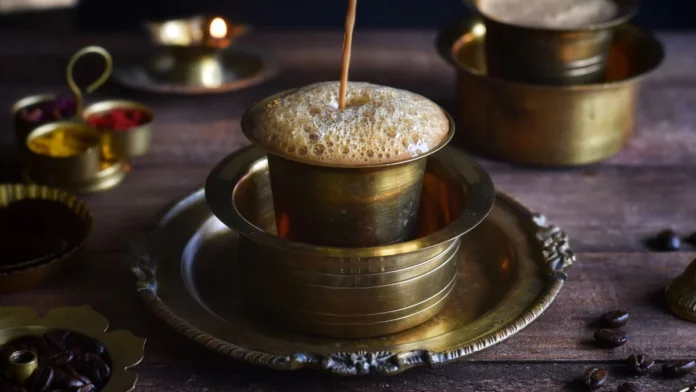Filter coffee, renowned for its robust flavors and soothing warmth, has emerged as a quintessential beverage deeply ingrained in the cultural fabric of South India. However, its journey from a colonial import to a cherished cultural icon is a tale woven with historical significance and societal influences.
According to digital creator Ahan A Swamy, the origins of South India’s beloved filter coffee are intertwined with the region’s complex social dynamics, particularly the caste system. Historically, coffee was introduced to India by the British during the colonial era, primarily for export purposes. However, it gradually found its way into the local culture, especially among the Tamil Brahmin community.
Swamy suggests that Tamil Brahmins adopted coffee consumption as a means to emulate the perceived sophistication and elitism associated with British colonialism. By embracing coffee culture, they sought to assert their social status and distinguish themselves from other castes. Consequently, filter coffee became not only a beverage but also a symbol of privilege and prestige within the community.
Over time, filter coffee evolved into a cherished tradition, intricately woven into the social fabric of South Indian society. Its preparation became a ritualistic process, characterized by meticulous attention to detail and adherence to time-honored techniques. From the selection of the finest coffee beans to the precise grinding and brewing methods, every step in the production of filter coffee is imbued with a sense of craftsmanship and tradition.
Beyond its cultural significance, filter coffee also holds a special place in the hearts of South Indians for its unparalleled taste and aroma. Brewed using a unique method that involves passing hot water through a blend of freshly ground coffee beans and chicory powder, filter coffee boasts a distinctively bold flavor profile and velvety smooth texture that sets it apart from other coffee varieties.
Filter coffee, with its deep-rooted cultural significance, has become more than just a beverage; it is a cherished tradition passed down through generations. The art of making filter coffee is often a family affair, with recipes and techniques handed down from grandparents to parents to children. In many South Indian households, the day begins with the aromatic aroma of freshly brewed filter coffee wafting through the air, signaling the start of a new day filled with warmth and connection.
One of the distinguishing features of filter coffee is its preparation method, which involves using a traditional coffee filter known as a “dabarah” and “tumbler.” The coffee filter consists of two cylindrical cups stacked on top of each other, with the upper cup holding the coffee grounds and the lower cup collecting the brewed coffee. Hot water is poured over the coffee grounds, allowing it to slowly drip through the filter and into the lower cup, resulting in a strong and flavorful brew.
The addition of chicory powder to the coffee grounds is another hallmark of South Indian filter coffee. Chicory, a root vegetable, is roasted and ground into a fine powder before being blended with coffee beans. This practice, which originated during the British colonial era when coffee was in short supply, adds a distinctive bitterness and depth of flavor to the brew, enhancing its complexity and richness.
Beyond its taste and aroma, filter coffee holds a special place in South Indian culture as a symbol of hospitality and camaraderie. It is often served as a gesture of welcome to guests in homes and restaurants alike, accompanied by traditional snacks like murukku or banana chips. The act of sharing a cup of filter coffee fosters bonds of friendship and kinship, creating moments of intimacy and connection in an increasingly fast-paced world.
Despite the rise of modern coffee chains and international coffee culture, filter coffee remains deeply entrenched in the hearts and palates of South Indians. Its popularity transcends social boundaries, uniting people from diverse backgrounds in their appreciation for this humble yet beloved beverage. Whether enjoyed in the bustling streets of Chennai or the serene backwaters of Kerala, filter coffee continues to evoke feelings of nostalgia and pride, serving as a timeless reminder of South India’s rich cultural heritage.

